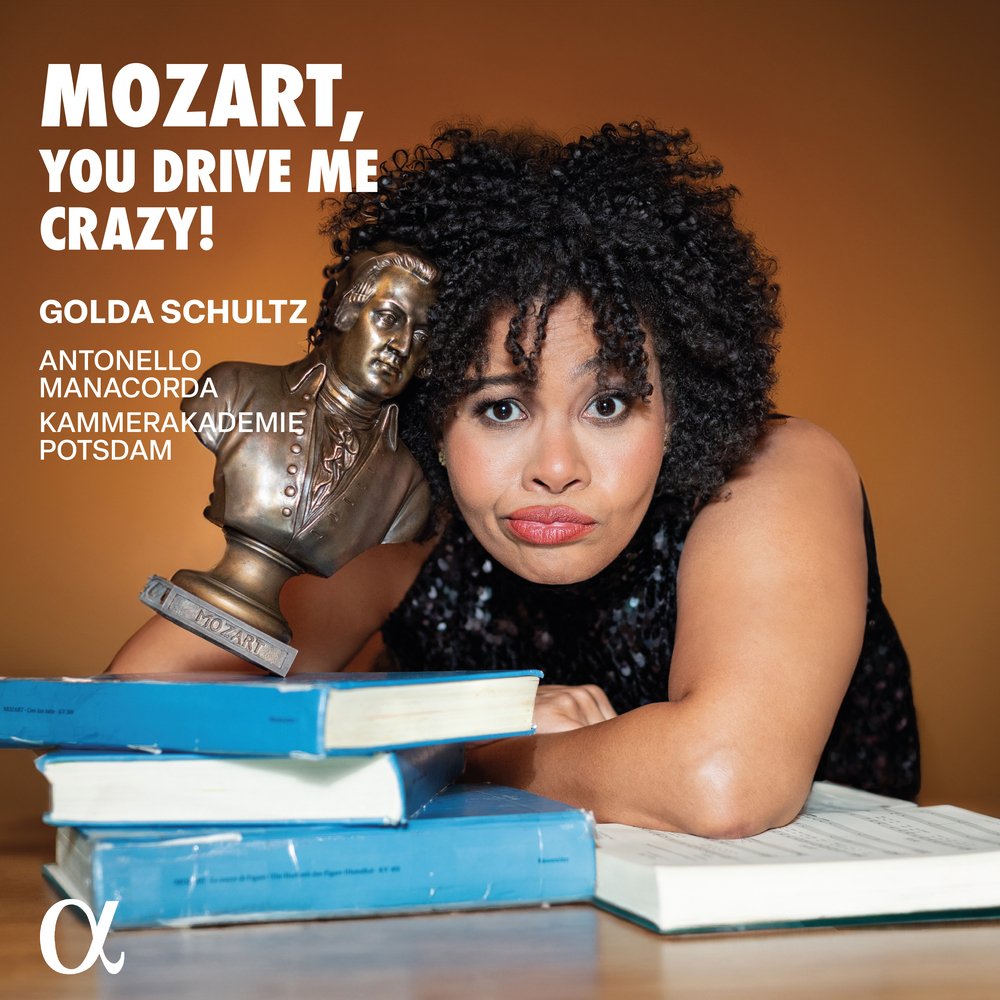Album Review: Mozart, You Drive Me Crazy!
Golda Schultz’s voice is reminiscent of a vibrant flower opening its petals toward the sun. For her Met debut, the South African soprano sang Pamina in my very first opera, Die Zauberflöte, and her singing was one of the elements that transfixed me. During the Met’s opening night of Porgy and Bess in 2019, she sang Clara, who gets the first song of the night, the well-known “Summertime.” I was listening on the radio, and the moment she began to sing, it was like a breath of fresh air.
Her first solo album, This Be Her Verse, was devoted to female composers like Clara Schumann and Rebecca Clarke. This one, Mozart, You Drive Me Crazy! is dedicated to the strong female characters from Mozart’s three collaborations with librettist Lorenzo Da Ponte: Le Nozze di Figaro, Don Giovanni, and Così fan tutte. In a display of her versatility, Golda takes on five characters in the three Mozart operas featured in the album: Susanna and the Countess in Le Nozze di Figaro, Donna Anna and Donna Elvira in Don Giovanni, and Fiordiligi in Così fan tutte. Some of the songs don’t credit all the supporting singers, and because there’s a quartet from Don Giovanni, a sextet from Così fan tutte, and the whole ensemble finale from Le Nozze di Figaro, there are quite a few of them. The organization is a little strange — the songs are shuffled rather than organized by opera —, but the singing is what matters, and Golda delivers. Let’s unpack that.
Don Giovanni
One of the more interesting selections is the quartet “Non ti fidar, o misera” before Donna Anna’s “Or sai chi l’onore.” In “Non ti fidar,” Golda sings Donna Elvira, gently noble when addressing Anna but then angry at Giovanni’s labeling her insane. Golda then seamlessly switches to Anna for “Don Ottavio, son morta… Or sai.” She sings “Or sai” with boldness and delicious punch, ferociously conveying Anna’s thirst for revenge on Giovanni for murdering her father.
Golda also takes on Elvira’s difficult aria “In quali eccesi, o Numi… Mi tradì quell’alma ingrata,” the title of which is miswritten as “Mi tradì quest”alma ingrata” (but correctly sung). The recitatives that come before Mozart arias are hugely important, and Golda includes the recits before all the centerpieces. Wisely, she doesn’t treat them as merely the lead-ups to the arias, delivering them with vivid urgency. “Mi tradì” itself is clear as a bell and definitively one of the best renditions of the song I have ever heard.
Le Nozze di Figaro
In the duet “Canzonetta sull’aria,” in which Golda sings the Countess, she noticeably darkens her tone to more clearly distinguish between her and the Susanna. The latter is not credited, but Golda clarified that it’s Simone Easthope, an Australian graduate of Juilliard, who also sings Donna Anna in the Giovanni quartet.
Golda indulges us with both the Countess’s and Susanna’s principal arias, “E Susanna non vien… Dove sono” and “Giunse alfin il momento… Deh, vieni, non tardar”. “Dove sono” shows off Golda’s silky legato to luxurious effect, and is one of the highlights of the album. The point of “Deh, vieni” is to tease Figaro, and rarely for recorded versions (or any, really), Golda’s has a deliberate quality, as if Susanna knew that Figaro was listening, which she does.
In the finale, “Gente, gente… Contessa, perdono,” when Golda’s Countess Almaviva forgives the philandering Count, she sounds like an angel of mercy. The bass-baritones singing the Count and Figaro sound suspiciously similar… weigh in, readers?
Così fan tutte
The sextet “Alla bella Despinetta” includes a cameo from French coloratura Julie Roset, Operalia’s 2024 First Prize winner, as the mischievous maid Despina, and mezzo Ashley Dixon as Dorabella. It’s unusual for opera albums to include multiple numbers where other singers get at least as much prominence as the principal, and Mozart, You Drive Me Crazy! is refreshingly generous.
Golda is named for the late Israeli prime minister Golda Meir, whose formidable strength Golda’s mother admired. Fiordiligi’s defiant Act 1 aria “Come scoglio,” also draws on strength, albeit of a different kind, as Fiordiligi puts the “Albanians” (her and her sister’s disguised lovers) on notice that she will stay faithful. In an interesting tack, Golda’s rendition mixes smoothness and stoicism, closing the song with captivating runs that I imagine represent the winds Fiordiligi vows will not move her.
One act later, Fiordiligi’s heart is reluctantly yielding, and in “Per pietà, ben mio, perdona,” she begs for her absent fiancé’s forgiveness. I believe it could have benefited from a less restrained approach, but it is still meltingly lovely. Soon, she’s finally won over in the duet “Fra gli amplessi in pochi istanti.” Per Mozart and Da Ponte, “thus do all women.”
Mozart, You Drive Me Crazy! is an exquisitely juicy album from one of the world’s most exquisite sopranos. It’s now fully available — give it a listen!

